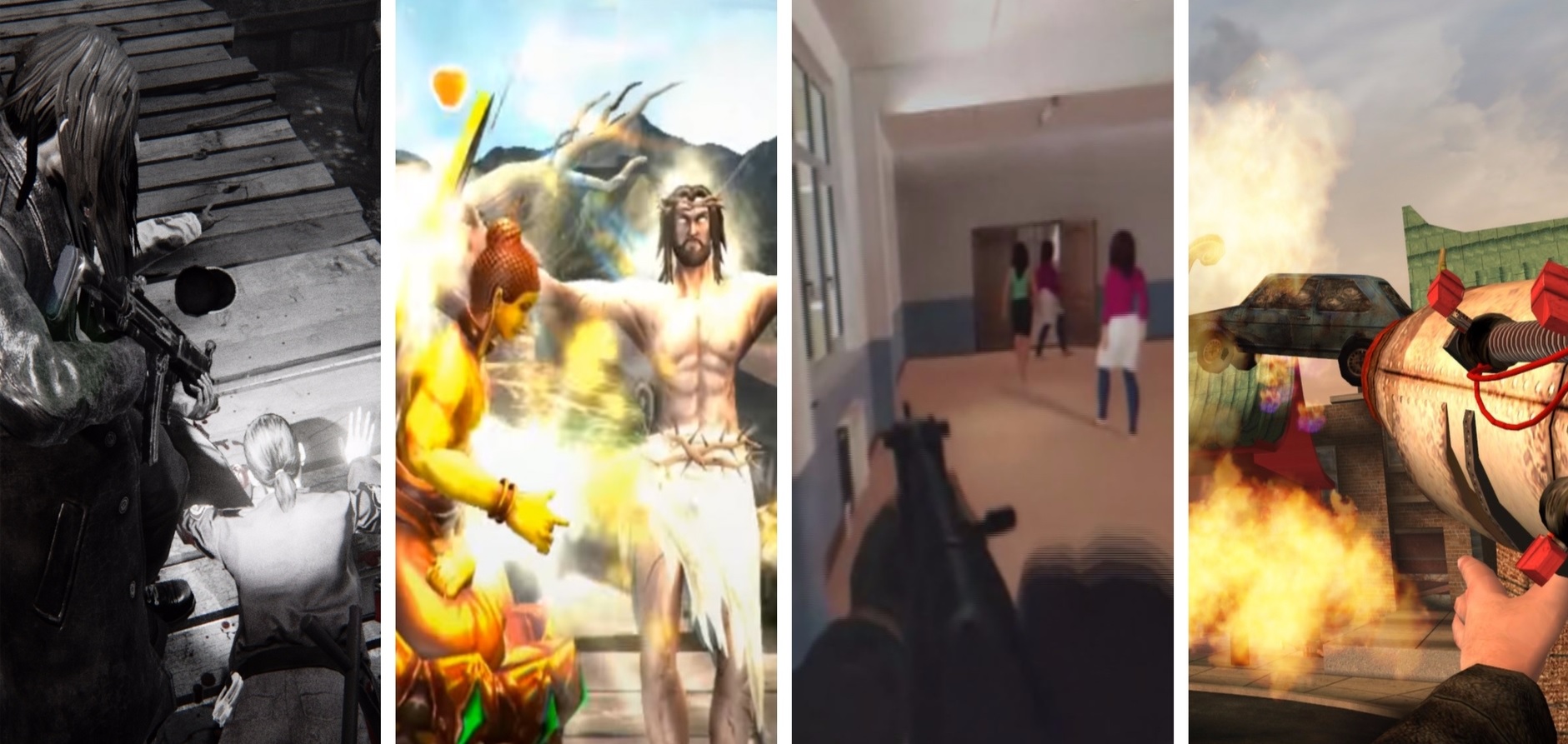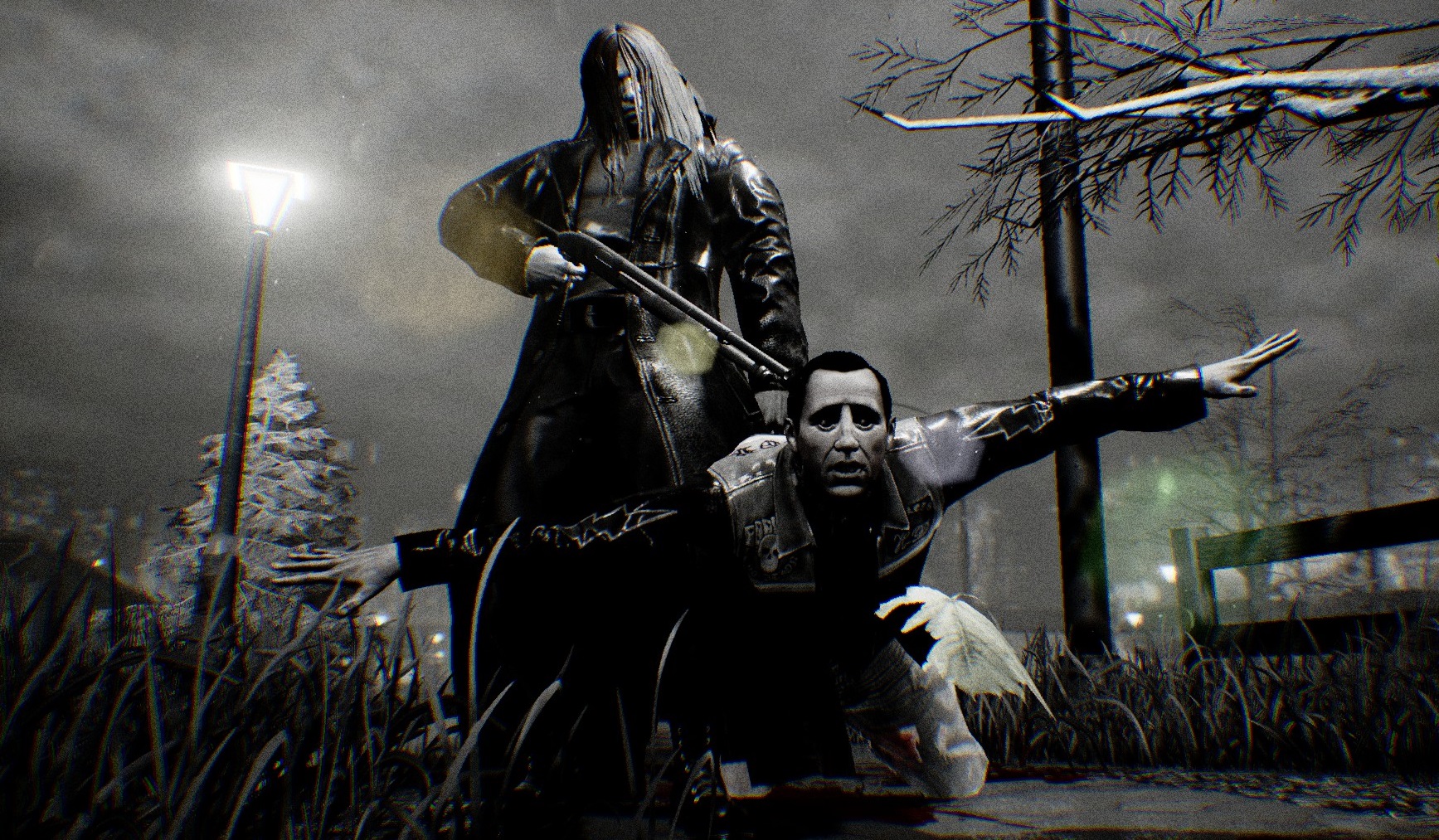7 Most Controversial Indie Games
For every Papers Please, there’s a Border Patrol.

When game-making tools are placed into the hands of the many, those tools are bound to be abused. It’s true that video games can function as sophisticated vehicles of complex messages and sentiments that hold the potential to enlighten and persuade. That power, however, can easily be tuned into the wrong frequencies.
Games created with the sole purpose of causing controversy are often the most violent, ignorant, and uncomfortable titles available. In the interest of toeing the line between glorification and exposing home truths to be acknowledged and understood, even developers with the best of intentions can fall on the side of the former. We investigate seven titles that did just that, some offering despicable messages in the hopes of achieving a headline, and others falling short of insightful commentary, instead landing in the realm of the raised eyebrow.
7. Hatred

Hatred might just be one of the most controversial games ever to make it onto Steam. It garnered national headlines around the time of its launch in 2015 and continues to be a point of contention to this day, as we’ve mentioned previously: Indie Games: Censorship, Scandals and Challenging the Status Quo. The crux of Hatred’s controversy is centred around its use of extreme violence and provocative themes, which exploded into the public consciousness with the release of its shockingly violent trailer. The gratuitous murder of unarmed civilians provoked strong reactions worldwide with many calling for the game to be banned, which it was for a time. In a strange twist, the developers claim it was Gabe Newall himself who reinstated the game onto Steam Greenlight after sending them an email apologising for the removal.
The developers responded to the trailer’s criticisms by claiming that the game was a statement, an expression of freedom in contrast to what they perceived as a politically correct movement brewing within the industry. They even claim the game was ultimately about honesty, as they don’t try to justify the violence by using a fake narrative as a shield. This premise was really the bone of contention for most people. Hatred was game about a lone, male gunman draped in a dark black trench coat whose sole purpose is to maim and slaughter as many innocent people as he could. After all, as the game states, ‘only a killing spree will make you die spectacularly and go to hell’.
Releasing at a period of high contention about video game violence, a title concerning itself with a mass killing spree because the protagonist hates humanity was never going to go down well. For instance, Hatred was one of only a handful of games at the time to receive an adult only rating – the highest rating a video game can get.
6. Active Shooter

Active Shooter accomplished a lot – and not much of it good. Not only was it banned from Steam days before its intended release date, but it was pivotal in bringing about Valve’s new policy towards controversial games onto its platform – a contentious move in itself. All the while, Active Shooter was attracting attention from mainstream media and horrifying audiences across the world.
How was it that an amateur project by a young Russian developer became a catalyst for so much outcry? Simple. In a world in which school shootings are tragically, terrifyingly commonplace, Active Shooter promised to let you live one out. Not just as a SWAT team, or a victim, but the shooter themselves. While people still mourned the horrors of incidents like the Parkland shootings, here was a school shooter simulator brazenly featuring a murder counter.
You’d have thought that Steam exile would be the end of Active Shooter’s story, but with a title change to Standoff and a move to a private storefront, it lives on, albeit, with only 72 total sales at the time of writing. The title has quickly faded from media inferno to a dimming ember.
5. Border Patrol

In a post-Trump world, Border Patrol stands out as one of the most uncomfortable exercises in Flash game racism to be found on the internet. Players are urged to shoot offensively caricatured Mexican immigrants along the border line of the United States, with the main call to action existing solely as ‘keep them out… at any cost!’.
Originally popping up in 2002, the game has been in and out on online news sites according to the tides of political upheaval surrounding the title’s context. 2006 saw a pivotal amount of attention paid to the game, perhaps elevating it even further in the realm of public consciousness. As it stands, Border Patrol represents some of the worst results of Flash falling into ignorant hands possible.
4. New York Defender

The 9/11 terrorist attacks killed 2,996 people and injured over 6,000 others in what has gone down in history as one of the worse human atrocities ever committed. To make a video game about that is beyond insensitive. That is exactly what the creators New York Defender, Stef & Phil did in the days following the attacks. The controversial flash game puts you in control of a laser cannon which you use to shoot down a constant stream of airliners flying at the twin towers in an effort to build up a high score. Eventually, the towers succumb to the damage and collapse leaving you to start over and attempt to beat your previous record. The game drew widespread condemnation online due to its context and timing, which clearly intended to capitalise on a tragedy through shock tactics.
Bizarrely, New York Defender was not an original idea and was in fact copied from a game that released earlier in the year before the 9/11 attacks. Trade Centre Defender, a flash game released as part of Angelfire Arcade saw the player take control of a machine gun tasked with shooting down jets before they hit the World Trade Centre buildings. Web hosting company Lycos pulled the game from the site on 13th September, two days after the attacks and issued this statement: “Please note — the game was not meant to offend anyone; my deepest condolences to all of you who have lost someone in this tragedy.”
The game then later appeared on another website as New York Defender, albeit with slightly changed visuals and clear reference to the World Trade Centre attacks added along with more dramatic jet sounds. It’s not hard to see why New York Defender was controversial or why it remains so today. Video games, like other forms of media, have the ability to shock and appal and this controversial title certainly did that.
3. Fight of Gods

Fight of Gods is a game with many levels of controversy. First, there are the obvious religious figures flinging punches at each other debacle which, in itself, was enough to ruffle the internet’s feathers. Then, there’s the resulting fallout across Malaysia and Thailand which saw censorship heckles rising at an unprecedented rate. Let’s face it, Jesus smashing Buddha across the face with the nails still in his wrists wasn’t exactly going to make it among the more conservative gaming audience.
However, when the Malaysian government took to banning the entire country’s access to Steam in response, things stepped up a notch. Everything eventually settled, with Steam being restored albeit without the divine brawler gracing its storefront, however, the debate has widely been regarded as a pinnacle moment in the video game censorship debate.
2. Postal 2

Postal 2 easily sits in the Hall of Fame/Shame as one of the most infamous video games ever released. A frankly bonkers black comedy featuring ‘The Postal Dude’ rampaging through his hometown, it amassed bans from an impressive number of countries, including Sweden, Germany and Malaysia. The game is still outlawed in New Zealand, to the point where even trying to buy it is a punishable offence.
In theory, the player could choose to not harm anyone in Postal 2. But this route was difficult and not particularly encouraged. The odds are you’d slaughter people left, right and centre to accomplish missions, whether blowing up police officers with rocket launchers, hacking prostitutes to death or going on a civilian shooting spree.
Violence was only part of Postal 2’s offensive nature, too, albeit a big part of it. Openly flaunting racist, sexist and homophobic jokes and stereotypes, it was tasteless in almost every way imaginable. But not too surprisingly, the game had an audience and still does – Postal 2 is still available on Steam and it’s still receiving updates 15 years later.
1. Super Columbine Massacre RPG!

A 1999 free indie game built with RPG Maker sought to make waves in the post-Columbine world of school shooting analysis and prevention. Unfortunately, a lack of coherent messaging and often rambling execution led the game to become one of the most refuted explorations in video game messaging of the era. Super Columbine Massacre RPG! offers players an insight into the world of Dylan Klebold and Eric Harris on the day of the most infamous school shootings in history.
While obviously, this thematic subject is quick to raise eyebrows, creator Danny Ledonne has defended the title, saying “My goal in creating the game is to help everyday audiences understand the world of the killers… I felt we might move closer to understanding and reaching actual solutions to the ongoing epidemic of school shootings”. This is one controversial game that comes with some baggage.
Indeed, if we are to consider the ability of video games to promote a message and engage audiences in topics on a much deeper level, such an exploration into the darkest side of humanity should prove fruitful. Unfortunately, with this power comes a required understanding of a great deal of nuance. A nuance missed by Ledonne which ultimately led him to be removed from competition at the Slamdance Guerilla Gamemaker Competition and banned from Colorado’s Adams State University campus.
Racist, sexist, homophobic, historically insensitive games won’t cease to exist after the examples above have been publicly slammed. Instead, they will continue to bloom in popularity. Give humanity the ability to create experiences for others and a few will always develop the most despicable ones possible.
But perhaps there’s potential. While the games on this list are mostly just plain offensive, other developers have tackled sensitive topics in a different way – offering insightful commentaries and eye-opening analysis. For every Border Patrol, there’s a Paper’s Please.

